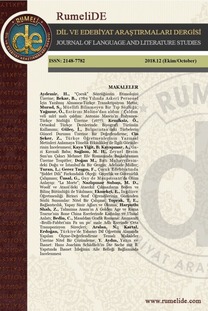Métro Saint-Michel’ de sözcük öğretimi yöntemlerinin didaktik analizi
Bu çalışmanın amacı, 2006 yılında CLE International yayın evi tarafından yayınlanan, Türkiye’de A1 düzeyinde üniversite Fransızca Öğretmenliği Programları hazırlık sınıflarında okutulan Métro Saint-Michel adlı Fransızca yöntem kitabının özellikle sözcük bölümlerini eylemsel ve durumsal bir perspektif çerçevesinde Fransızcanın yabancı dil olarak (FLE) öğretimi/öğrenimi bağlamında irdelemektir. Kelime, dilbilgisi ve sesletim konuları üzerine çalışmaların yer aldığı yöntem kitabında sözcük bölümü üzerine yoğunlaşacağız. Kitap, tematik bir yapılanmaya göre hazırlanmıştır. Aynı tema, dilbilgisi alıştırmalarında tekrar ele alınmakta, ancak özel alıştırma öğeleri olarak yer almaktadır (kelime ve cümle tamamlama, sınıflandırma, eşleştirme). Böylece hedef, Fransızca öğrenenleri Fransızca öğreniminde sözcük bilgisinin ne denli önemli olduğunun bilincine vardırmaktır. Öte yandan, bu kitabı kullanan her öğretmen, öğretmenlik meslek bilgisi yanında kitaptaki alıştırma ve etkinlik örnekleri ile daha etkin bir öğretim sürdürme olanağı bulacaktır. Ayrıca, bu çalışmada sözcük öğretimi yöntemlerine göre, Fransızca yöntem kitapları için bir çözümleme ve değerlendirme ölçeği geliştirilmiştir.
Anahtar Kelimeler:
Yabancı dil olarak Fransızca (FLE), Fransızca yabancı dil öğretimi, sözcük
Didactic analysis of lexicon teaching methodologies in Métro Saint-Michel
This article aims to present an analysis of Lexicon's conception in the teaching/learning of French as a foreign language (FLE) conceived in an action and situational perspective from a study of the manual Saint-Michel of french method in general and lexicon sections in particular, published by CLE International in 2006 and used in an elementary French course for students of the preparatory level A1 level in Turkey. In this analysis, we are going to focus on the "Glossary" part of the textbook which groups the points to work in the lexicon, grammar, and phonetics. This part is essentially thematic. It is repeated in the grammar exercises, but it is itself the subject of specific exercises (words and sentences to complete, classification, crosswords, etc.). It will, moreover, be the object of this analysis which aims to highlight the importance of the lexicon given in the learning of the French language which is intended for the learners of FFL. Moreover, since this manual, each teacher, according to his predispositions, will be able to find inspirations and concrete examples of activities in order to carry out an objective/subjective training transmission. On the other hand, recommendations accompanied by a grid of analysis of French as foreign language textbooks according to lexical teaching methodologies will take place in this analysis.
Keywords:
French foreign language (FFL) teaching FFL, lexicon, vocabulary,
___
- Germain, B., & Picoche, J. (1997). Le vocabulaire et son enseignement, Université d’Amiens, Nathan. Grecia, M. (2017). https://arlap.hypotheses.org/8202, accédé: 08.01.2017. Günday, R. (2015). Yabancı Dil Öğretiminde Yaklaşımlar, Yöntemler, Teknikler ve Multimedya Araç ve Materyalleri, Ankara: Favori Yayınları. Kartal, E. (2014). L’enseignement/apprentissage de la grammaire dans les manuels de FLE en Turquie (1931-1949), Société Internationale pour l’Histoire du Français Langue Étrangère ou Seconde, 91-108. Kuşçu, E. (2016). Les méthodologies et les méthodes d’enseignement/apprentissage du FLE en Turquie : Je parle Français et Je voyage en Français, International Journal of Languages’ Education and Teaching, 3,105-121. Larthomas, P. (1980). Le Langage Dramatique, sa nature, ses procédés, Paris: Presses Universitaires de France. Mızı, K. (2018). La perspective actionnelle et l’approche par les tâches en classe de FLE dans le secondaire algérien, AJC Crem. Le Ministère de l'Education de Terre-Neuve et du Labrador, (1992). Guide pedagogique pour le primaire. Monnerie-Goarin, A. (206). Métro Saint-Michel, Paris : CLE International. Niklas-Salminen, A. (1997). La lexicologie, Paris : Armand Colin. Procházková, H. (2013). Enseigner le vocabulaire en classe de FLE, Západočeská univerzita v Plzni Fakulta filozofická, Thèse de doctorat. Puren, C. (2012). Histoire des méthodologies de l’enseignement des langues, Paris : Nathan-CLE international. Riquois, E. (2010). L’exploitation pédagogique du texte littéraire et lecture littéraire en FLE : un équilibre fragile, 11e Rencontres des chercheurs en didactique des littératures, Genève, 247- 251. Tréville, M. C. (2000). Vocabulaire et apprentissage d’une langue seconde : recherches et théorie. Montréal : Éditions Logiques. Truong, Q. (2014). Les méthodes d’enseignement-apprentissage du français, langue étrangère, hier et aujourd’hui, Revue du Gerflint, 161-163. Turco, G. (2001). Lire la littérature à l'école. Pourquoi et comment conduire cet apprentissage spécifique de la GS au CM, Paris : Hatier.
- ISSN: 2148-7782
- Yayın Aralığı: Yılda 6 Sayı
- Başlangıç: 2014
- Yayıncı: Yakup YILMAZ
Sayıdaki Diğer Makaleler
‘Tangram’ adlı ders kitabının plurizentrik öğeler perspektifinde incelenmesi
Klasik Türk şiirindeki vefa kavramının Mahmûd Nedîm Paşa Divanı'ndatezahürü
Métro Saint-Michel’ de sözcük öğretimi yöntemlerinin didaktik analizi
Netflix'in yerel orijinal dizilerinde alt yazı çevirisi: Hakan Muhafız kültürü muhafaza ediyor mu?
Âşûrâ kıyamı ve Kerbelâ vak’ası’nın Safevî iktidarı öncesi Fars şiirindeki yansıması
